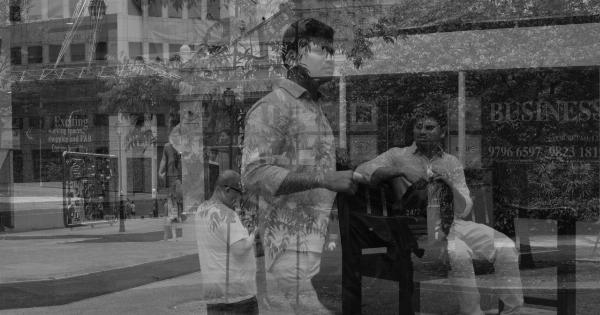Poverty is a harsh reality that affects millions of people around the world. It is a condition characterized by a lack of basic necessities and resources, making it difficult for individuals and families to meet their essential needs.
Despite its pervasive nature, there are some who choose to turn a blind eye to the struggles of the poor. This article aims to explore the reasons behind this blindness to poverty and shed light on the consequences of ignoring such a critical issue.
The Invisibility of Poverty
One reason why some individuals choose to ignore the struggles of the poor is the inherent invisibility of poverty. In many societies, poverty is easily overlooked, as it often exists behind closed doors or in marginalized communities.
Unlike other social issues that are more visible and capture public attention, poverty tends to remain hidden from public view, making it easier for some to dismiss or ignore.
Perceived Moral Responsibility
Another reason for blindness to poverty is the perception that poverty is solely the result of individual choices or shortcomings.
Some people believe that those living in poverty are solely responsible for their circumstances and thus should bear the consequences. This misguided belief leads to a lack of empathy and a refusal to acknowledge the systemic issues that contribute to poverty.
Stereotypes and Stigmas
Stereotypes and stigmas associated with poverty also play a significant role in the ignorance towards the struggles of the poor. Society often places blame on the poor for their situation, labeling them as lazy, unmotivated, or even as criminals.
These negative stereotypes perpetuate the idea that poverty is a personal flaw rather than a societal issue, creating a barrier to understanding and compassion.
Disconnect from Personal Experience
Many individuals who are insulated from poverty by their own socioeconomic status may find it challenging to empathize with the struggles of the poor.
It is common for people to surround themselves with like-minded individuals and communities, creating a bubble of privilege that shields them from the harsh realities experienced by those in poverty. This disconnection can lead to a lack of understanding and compassion.
Uncomfortable Truth
Confronting poverty can be uncomfortable and unsettling, especially for those who are not directly affected by it.
Acknowledging the struggles of the poor often requires individuals and society at large to examine their own privilege, question long-held beliefs, and take responsibility for addressing systemic inequalities. It is easier for some to ignore poverty altogether rather than face these uncomfortable truths.
Media Influence
The media plays a significant role in shaping public perception and awareness. However, media coverage of poverty is often limited and sensationalized.
Poverty is either ignored entirely or portrayed in a way that perpetuates stereotypes or perpetuates a sense of hopelessness. The lack of accurate and comprehensive representation of poverty in the media contributes to the general disregard for the struggles of the poor.
Lack of Awareness and Education
A lack of awareness and education about poverty and its causes also contributes to the blindness towards the struggles of the poor.
Without understanding the multifaceted nature of poverty and the systemic factors that perpetuate it, it is challenging to empathize with those affected. Education and awareness initiatives can play a crucial role in shining a light on poverty and creating a more compassionate society.
Self-Preservation and Fear
For some individuals, acknowledging the struggles of the poor may evoke feelings of guilt, shame, or fear. It can be easier to distance oneself from the harsh realities of poverty and focus solely on personal success and well-being.
This self-preservation mentality often leads to a conscious or unconscious decision to ignore the struggles of the poor.
The Consequences of Ignoring Poverty
The consequences of ignoring poverty are many and far-reaching. When society turns a blind eye to the struggles of the poor, it perpetuates and exacerbates existing inequalities.
It hinders progress towards societal equity and denies individuals living in poverty the opportunity to improve their conditions and break the cycle of poverty.
Increased Social Fragmentation
Ignoring poverty can lead to increased social fragmentation, as it deepens the divide between the haves and have-nots. It erodes social cohesion, fostering resentment and alienation among different social groups.
This fragmentation can have severe consequences, such as rising crime rates, social unrest, and decreased overall societal well-being.
Lost Economic Potential
Poverty not only affects individuals and families, but it also has economic implications for society as a whole. Ignoring poverty means disregarding the untapped potential of those who could contribute to the workforce, innovation, and economic growth.
By failing to address poverty, societies miss out on valuable human capital and hinder their own progress and prosperity.
Moral and Ethical Concerns
From a moral and ethical standpoint, ignoring poverty raises significant concerns. A society’s strength and compassion are often measured by how it treats its most vulnerable members.
By turning a blind eye to the struggles of the poor, individuals and society undermine their own moral and ethical values, contributing to a culture of indifference and apathy.
Missed Opportunities for Social Change
Addressing poverty requires collective action, social policies, and systemic changes. By ignoring poverty, opportunities for positive social change go untapped.
When individuals fail to acknowledge the struggles of the poor, they forfeit the chance to advocate for policies that promote equality, fairness, and justice.
The Path to Empathy and Action
Breaking the cycle of ignorance and indifference towards poverty starts with education and awareness. It requires individuals to challenge their own biases, engage in meaningful conversations, and seek out diverse perspectives.
Empathy and understanding must be cultivated to create a society that values and prioritizes the well-being of all its members.
Fostering Community Engagement
Community engagement plays a vital role in addressing poverty. By actively participating in initiatives aimed at poverty alleviation, individuals can make a positive difference in the lives of the poor.
Volunteering, donating resources, and supporting organizations that work towards poverty eradication are all tangible ways to combat the blindness to poverty.
Rethinking Public Policies
Government and policymakers have a crucial role in combating poverty. Rethinking public policies to prioritize social welfare, investing in quality education, healthcare, and affordable housing can help break the cycle of poverty.
By advocating for policies that promote equality and social mobility, individuals can contribute to the transformation of society.
Conclusion
The blindness to poverty is a complex issue with various underlying factors. From stereotypes and stigmas to a disconnect from personal experience, these factors contribute to a concerning disregard for the struggles of the poor.
However, by acknowledging and understanding the reasons behind this blindness, we can begin to address the issue and work towards creating a more inclusive and compassionate society that leaves no one behind.































